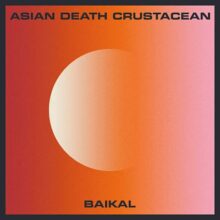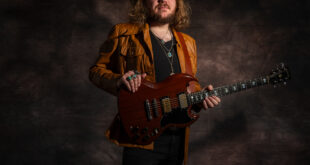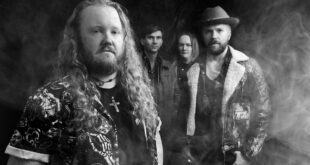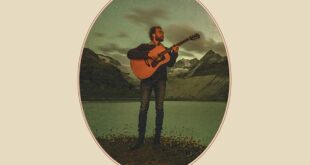London based experimental metal outfit Asian Death Crustacean are set to release their debut album ‘Baikal’ on June 26th. The band; Dan Peacock (guitars/sound design), Rob Doull (guitars), George Bunting (bass guitar) and James Kay (drums), took some time out from the album launch preparations to talk to us about the background of the band, the fairly unique recording process, as well as individual musical memories.
 DGM: What are the origins of the band, and how long have you been playing together?
DGM: What are the origins of the band, and how long have you been playing together?
James: The band came together about six years ago, out of the demise of a jazz fusion and a blackened death metal project. We all knew each other and had played in various combinations in other projects, but fusing together the remnants of the two bands was very experimental at first and we had no idea if it would work. Despite the big range of influences in the project, we’ve found that we click together pretty quickly during the writing process, and we all really enjoy the freedom and scope available for taking compositions in whatever direction feels interesting.
DGM: How did you feel performing your first gig? And how was it?
George: Our first show was about a month after we first went into a room to play together. While some of the material we played that night did eventually morph into a part of our debut album, it was in a very embryonic state and we were still improvising heavily and taking risks, which was somewhat nerve wracking but also a very exciting way to cut our teeth playing live.
DGM: What should people expect when they check the band out? How would you describe yourselves?
Rob: We hope that people who check us out will find something fresh in the breadth of influences running through the music, and the way we try to blend them in waves of changing mood and intensity.
Overall, I think we’d call ourselves experimental metal, but there’s a lot of inspiration from jazz, ambient music and a variety of other genres coming through as well.
DGM: Debut album ‘Baikal’ is due June 26th. Any nerves at all with it being so close? Also, what was the gestation period of the album like?
Dan: The material had a pretty long gestation period, with lots of cycles of revisiting and refining the compositions, and the pieces definitely grew a lot from giving them that space to breathe. Some of the best developments came from the small variations and improvisations that sprung out of playing them live, as well as from us incorporating fresh ideas as each of our musical tastes developed and intermingled over time.
It’s definitely a bit surreal to be releasing the album after so much work and thought went into it over a long period, but at the same time it also just became clear to us at a certain point that the material needed to be committed to a recording and shared.
 DGM: With ‘Baikal’ being an instrumental album, was it difficult to have a particular theme running through it?
DGM: With ‘Baikal’ being an instrumental album, was it difficult to have a particular theme running through it?
James: I wouldn’t say it’s necessarily hard to express themes through instrumental music, but it does make the themes more abstract and introspective, as well as more open to people’s interpretation. We didn’t have a theme in mind when we started composing ‘Baikal’, but we found the music, for us, took on themes around metamorphosis, transformation, and duality. It’s in the nature of this kind of music, though, that it’s open to people seeing completely different things in it. We see that as part of what makes instrumental music interesting, rather than something that makes it feel empty of meaning. We took a similar view in choosing the artwork for the album, going for a simple, ‘symbolic’ feeling piece which you can read in multiple ways, rather than a more literal photograph or drawing of a particular object or scene.
DGM: Which movie would ‘Baikal’ be the perfect soundtrack to?
George: A sci-fi movie, maybe a cross between 2001: A Space Odyssey and Alien.
DGM: One of the tracks; ‘Baikal V’, is over ten minutes in length. Is it difficult to create a song this long and keep the listener interested? Can you go too far?
Rob: The thing we generally try to focus on is not aiming for a piece to be a certain length, but giving the ideas the space to work themselves through and achieve the desired effect. Sometimes we move between ideas more rapidly to try to give a more agitated, chaotic, feeling, but other times you need to allow a mood to sit for a while or else it doesn’t really work. If you don’t give enough space to a building section, for example, the pay-off of the drop or riff which follows won’t feel like it ‘hits’ properly.
DGM: The album was recorded in a subterranean studio in Sweden. Did this enhance the atmosphere and vibe in the studio? It must have been very claustrophobic!
Dan: The studio was accessed via an anonymous looking door which then emerged into this other world – on the first day we walked through a slightly dark and dingy underground space, which seemed a touch ominous, but then opened this heavy metal door to find David Castillo chilling out and sipping coffee in a very cosy kitchen lounge area. The studio space turned out to be very comfortable, and we could have stayed there for months in the apartment attached to it. It had a great vibe of being in another world, separated from everything else, which was perfect for getting into a creative mindset and seeing through the long days.
DGM: The new music scene is bursting at the seams with fresh talent. In what ways do you feel a band has to stand out from the others trying to build a name?
George: I think quality material shines through in the end – provided that you can get eyes and ears on it in the first place – so the key is figuring out how to use social media and other digital forms of outreach in a way that works and still feels authentic.
DGM: What band out there at the moment do you feel that you would be best suited to open for?
James: This is a tough one for us due to the diversity of influences in our material, but some good candidates could be Russian Circles, Cult of Luna, Neurosis, or Sunn.
 DGM: Who do you think will be the next band to break out?
DGM: Who do you think will be the next band to break out?
Rob: I recently found Barishi’s material through their latest album, ‘Old Smoke’ – definitely a band deserving of more acclaim.
DGM: What are your first musical memories? And what was the light bulb moment that made you go “I want to do that!”
George: My parents played a lot of 60s Pop and Motown records in the car when I was very young. When I was a teenager I got pretty into 80s American Punk and Hardcore, which was a pretty good jumping off point for learning to play bass. I think it was a band called the Descendents who really got me into picking out the commonalities between apparently very different genres though. Hearing the crossover between their playing and songwriting and that of the 60s Soul and Pop acts I’d grown up listening to was very interesting.
Rob: When I was starting to look at approaching the more technical side of guitar playing, I remember being completely blown away at Jason Becker’s technique and usage of neo-classical composition and harmony to create his own style; the word virtuoso doesn’t really do him justice.
From a more sonic perspective, Tom Morello was very important in changing the way I thought about guitar and how it creates sound. A lot of constraints on your sound or playing are self imposed and tend to be present because you’re sticking to norms. I learned from him that you should never be afraid to eschew these norms in the pursuit of musical development.
James: Discovering Elliott Sellers’ drumming, especially his cymbal work which was very fresh at the time. The first full-length record from Job For A Cowboy had a big influence on me at the point when I was just starting to take playing the drums more seriously.
Dan: Being shown Allan Holdsworth by my guitar teacher was a big moment for me, as he approached the instrument in a unique way that was very fresh to me, using phrasing at times more typical of saxophone than guitar. It really opened my eyes and encouraged me to experiment with a whole new range of ideas.
DGM: What was the last gig that you attended as a fan?
James: Brutal Assault Festival 2019, CZ.
George: Sleep at the Kentish Town Forum.
Rob: Watching James’ other band, Demcats, at Featherstone Castle last year.
Dan: Sunn at the Roundhouse, London.
DGM: What is the album that you have in your collection or Spotify playlist that would surprise most people?
Rob: James Brown – ‘Gravity’.
George: Jacob Collier – ‘In My Room’.
James: Erykah Badu – ‘Mama’s Gun’.
Dan: Freddie Gibbs & Madlib – ‘Bandana’.
DGM: What are your plans for the remainder of 2020; the longest year known to man?
George: Beyond releasing and promoting ‘Baikal’, we’re trying to use the lock down time to experiment with songwriting over video calls and sending each other ideas to collaborate on remotely, which is very new to us, having written the foundations of our first record while all living within a few minutes walk of each other. We’re also doing what we can to prepare to hit the live scene hard once it starts up again.
 Devil's Gate Music
Devil's Gate Music





